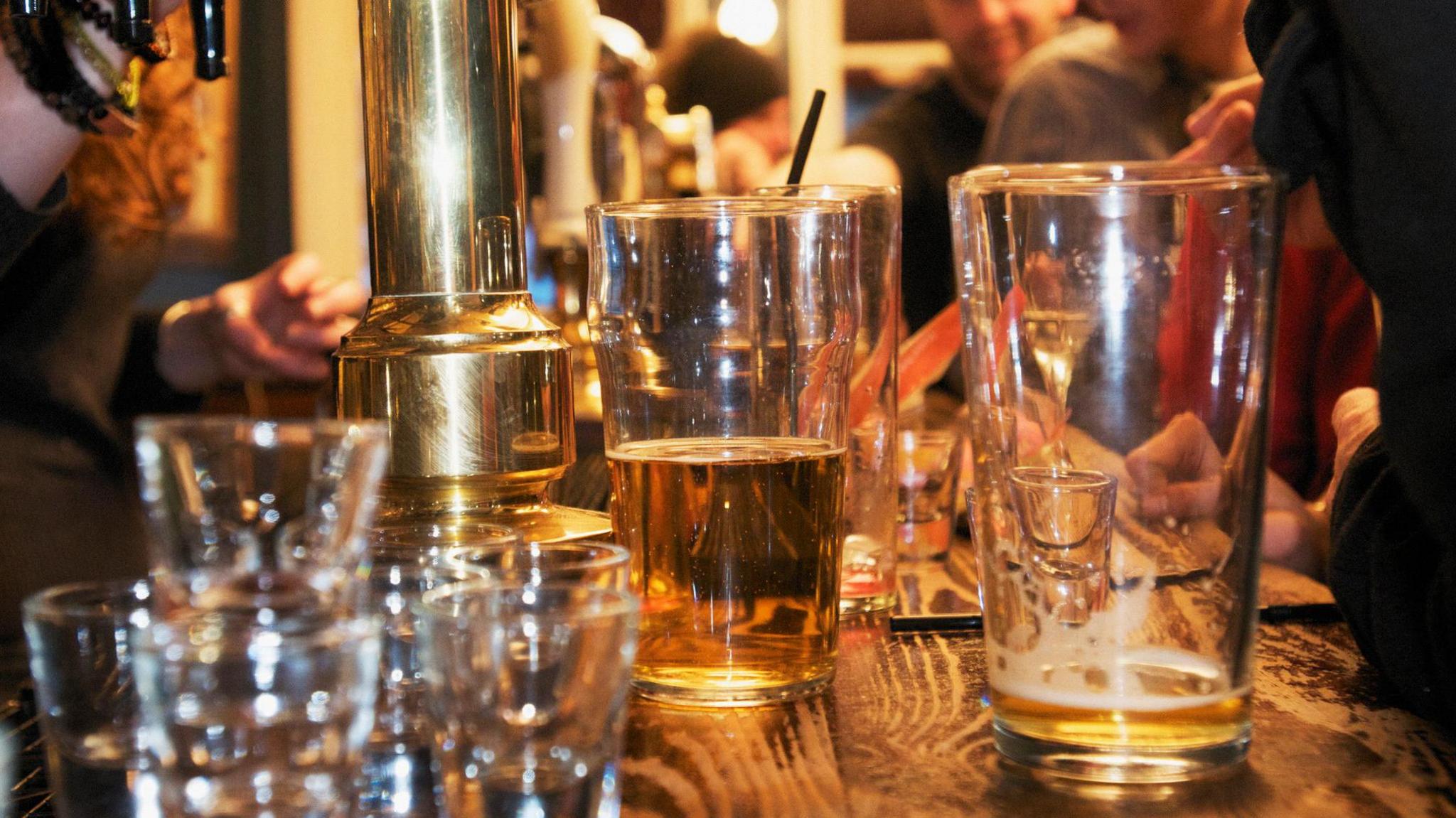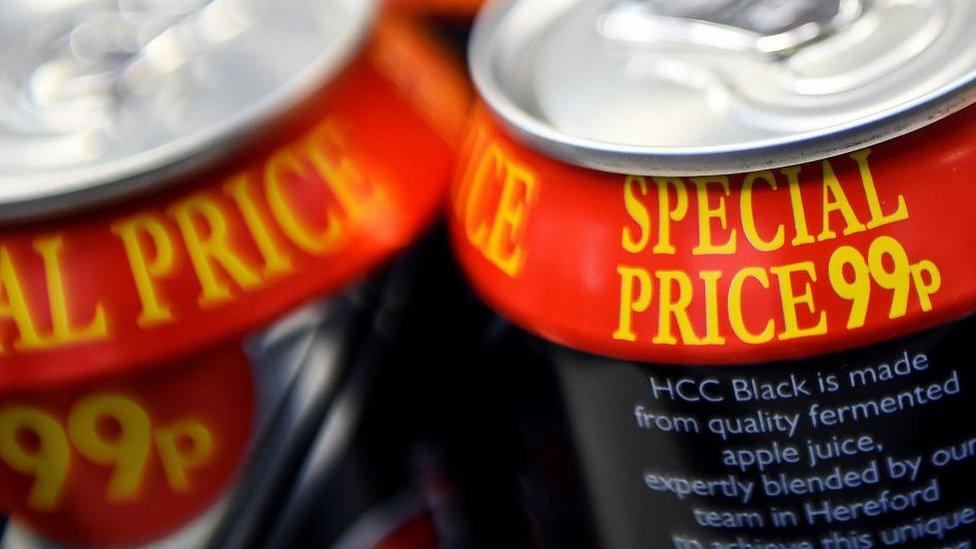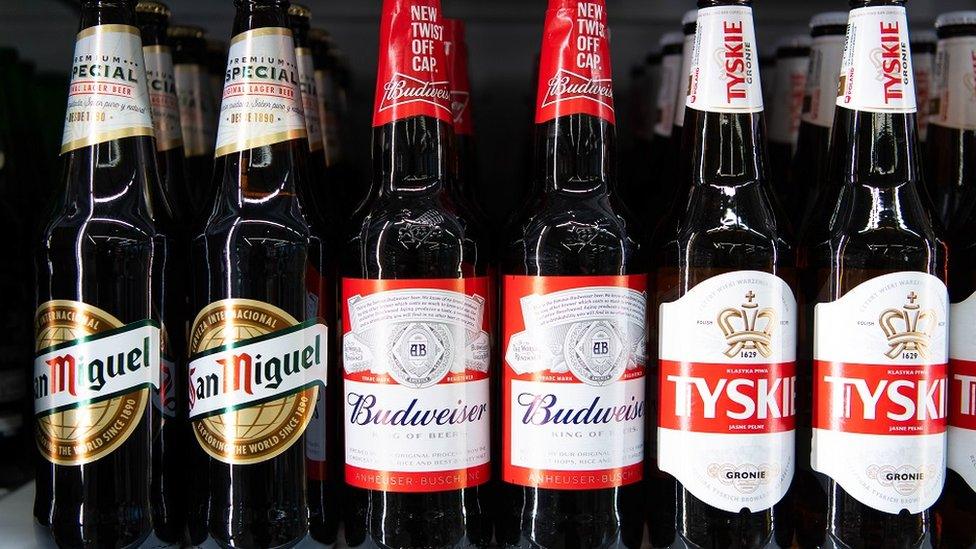Scottish alcohol deaths at lowest rate for five years

- Published
Alcohol deaths in Scotland fell last year to the lowest number since 2019, the latest official figures have shown.
The statistics from National Records of Scotland (NRS) revealed that 1,185 people died from alcohol-specific causes in 2024, a 7% decrease from 2023's 15-year record high.
Male deaths continued to account for about two thirds of the fatalities, but both male and female alcohol deaths decreased in the past year.
Maree Todd, drugs and alcohol policy minister, said that while Scotland was making progress on tackling harms caused by alcohol, the government "cannot become complacent".
People are dying from alcohol-specific causes at older ages on average than in the past decade.
Scottish alcohol deaths at 15-year high
- Published10 September 2024
Minimum pricing averts alcohol deaths, study claims
- Published21 March 2023
Alcohol-specific deaths do not include all deaths that can be attributed to alcohol.
The figures only include deaths from causes which are a direct consequence of alcohol consumption, such as wholly attributable causes such as alcoholic liver disease.
Fatalities were 4.5 times higher in the most deprived areas of Scotland compared with the least deprived areas, with Glasgow City, Inverclyde, North Lanarkshire, West Dunbartonshire and Dundee City having the highest number of deaths caused directly by alcohol in the period 2020-2024.
Adjusted for age, the alcoholic-specific mortality rate was 20.9 deaths per 100,000 people, a drop from 22.5 deaths per 100,000 people in 2023.
Figures from 2024 for alcohol-specific deaths in the rest of the UK have not yet been released, but in 2023 Scotland had the highest rate, external at 22.6 deaths per 100,000 people.
England had the lowest rate at 15 per 100,000.
'Many don't see their drinking as a problem'
Alcohol Focus Scotland, a charity working to reduce harm caused by alcohol, said the number of deaths remained "appallingly high and more than double the level of 30 years ago".
Alison Douglas, its chief executive, said: "Action taken so far hasn't matched the scale of this crisis. The Scottish government must do better.
"Not everyone who dies because of alcohol is dependent or addicted, and many don't see their drinking as a problem.
"Yet, prolonged heavy drinking can cause serious harm, such as liver disease, without any obvious warning."
The charity has called for liver scans to become more available in communities to give drinkers the chance to access treatment before the damage becomes irreversible.
"The problems we face are aggravated by constant messages that alcohol is essential to our lives," she added.
"We need to challenge this narrative, and adopt well-evidenced, cost-effective prevention measures."

The government says Minimum Unit Pricing has "saved hundreds of lives
Todd offered her "heartfelt condolences" to those affected by the loss of a loved one through alcohol.
She said: "It is welcome to see the number of deaths at the lowest level since 2019 and we are continuing to work closely with local Alcohol and Drugs Partnerships (ADPs) and other stakeholders to provide targeted, person-centred support, backed by record levels of funding of around £160m this year.
"However, while we are making progress on tackling the harms caused by alcohol, we cannot become complacent."
She added that it was a "public health priority" in Scotland and said the country's Minimum Unit Pricing (MUP) policy had "saved hundreds of lives and is likely to have averted hundreds of alcohol-attributable hospital admissions".
Scotland became the first country in the world to introduce minimum unit pricing (MUP) in May 2018, currently set at 65p per unit of alcohol.
A Scottish government-funded study published in March 2023 suggested the scheme's introduction in Scotland had led to fewer alcohol-related deaths and hospital admissions.
Colin Angus, professor of alcohol policy at the University of Sheffield, told BBC Scotland it was good to see the numbers of deaths reducing in Scotland again after an increase during the Covid pandemic.
"The evidence suggests that MUP is having a positive impact in Scotland but trying to say exactly how much is tricky," he said.
"There's a long way to go until we're down to the level of the rest of the UK, but its a positive step."
Rehabilitation and abstinence
The Scottish Conservatives said the death toll was "tragic and shamefully high".
Their drugs and alcohol spokeswoman Annie Wells said it was "clear the SNP's approach is not working" and needed to focus on rehabilitation and abstinence programmes.
"Ministers must stop seeing their flagship minimum unit pricing policy as a silver bullet when so many Scots families are tragically losing loved ones to the scourge of alcohol addiction," she said.
However, the Scottish Liberal Democrats said the "original impact of minimum pricing had decreased over time" because of inflation.
Alex Cole-Hamilton, Scottish Lib Dem leader, criticised the SNP's real-terms cuts to drug and alcohol services.
"At a time when alcohol continues to claim far too many lives, we need joined-up thinking and proper investment to stop this tragedy from wrecking families and communities across Scotland," he said.
Scottish Labour's health spokesperson Jackie Baillie said that while last year's decrease was "welcome", deaths were still 14% higher than they were a decade ago.
"Each death is a tragedy, and the latest figures represent 1,185 lives lost, with families and communities right across the country feeling the impact of those losses," she said.
"Tackling alcohol-specific deaths is not just about spending more money but spending it effectively – including by ensuring rehab facilities are available for those who need it."
Related topics
- Published31 January 2023

- Published7 June 2022
